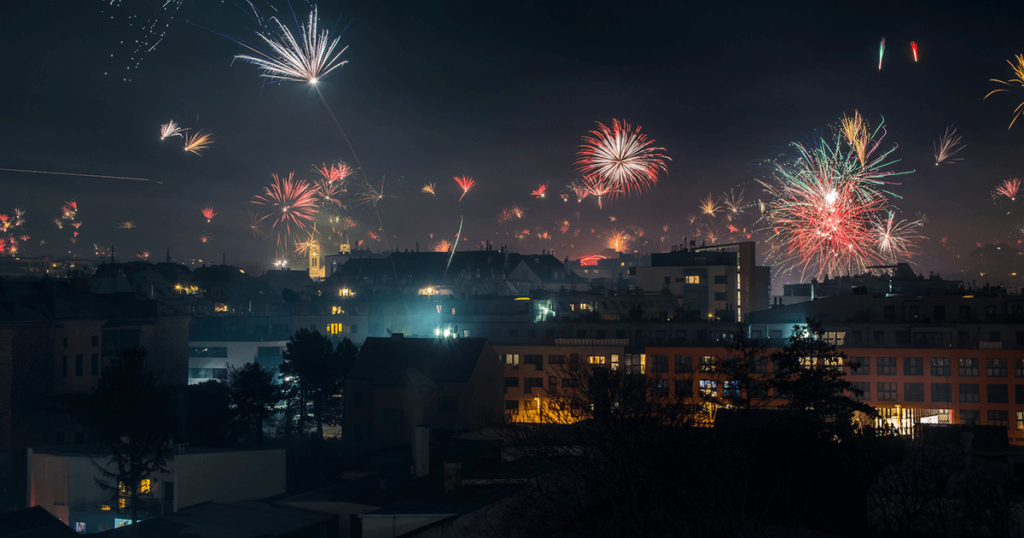
Every New Year’s Eve, for the duration of the day, I fill my house with the music of the Strauss family—Johann I, Johann II, Eduard, and Josef. My taste for this particular repertoire at this time of the year was formed in childhood, when I began watching the Vienna Philharmonic’s annual New Year’s concerts on television. (I also remember one New Year’s Eve—this must have been in the early 1980s—when our local PBS station broadcast a sparkling performance of the operetta Die Fledermaus, only deepening my association of the name Strauss with this festive period.) All those polkas, marches, and waltzes amount to one grand and frothy binge. Indeed, when it’s all finished, and I am happily sated, I have little desire to hear “On the Beautiful Blue Danube” or the “Tritsch-Tratsch Polka” for many months—at least not until the next December 31st comes around.
And so it was again this year: plenty of Strauss on New Year’s Eve and the broadcast of the Philharmonic’s concert the following night, with Riccardo Muti conducting an enjoyable, satisfying performance—and a somewhat personal one, too, what with its Italianate touches. My favorite conductors of these concerts in past years include the likes of Carlos Kleiber, Zubin Mehta, and Lorin Maazel, though one man arguably towered over them all when it came to the Viennese waltz—the orchestra’s former concertmaster Willi Boskovsky.
Born in Vienna in 1909, Boskovsky joined the Philharmonic in 1933, quickly ascending to the concertmaster’s chair, a position he held for more than four decades. In 1954, he succeeded Clemens Krauss as the leader of the New Year’s concerts, a role Boskovsky performed with panache, conducting, as both Johann Strausses did before him, in the manner of the Vorgeiger, that is, with his violin in hand. He felt this Viennese music deeply—it was, after all, his birthright, not some mere confection—and his interpretations were idiomatic, dignified, and charismatic. After his death in 1991, an all-too-brief obituary in The New York Times described him as “a master waltz violinist and conductor,” yet that description sells the artist short by quite a distance. In addition to his flair for waltzes and polkas, Boskovsky was a formidable soloist and talented chamber musician. As the leader of the Boskovsky Quartet and the Vienna Octet, he made impeccable recordings of Schubert’s Octet and Trout Quintet, the Mendelssohn Octet, the Mozart Clarinet Quintet, and the Beethoven Septet. I am especially fond of his ensemble’s version of the Brahms Clarinet Quintet (with Alfred Boskovsky, Willi’s younger brother, playing the clarinet), the deep pathos tempered by a feeling of poetic refinement, every line full of mystery and depth.
Boskovsky’s final New Year’s concert took place in 1979, the first time the affair was recorded live. Last week, I listened to that recording again and heard anew what magic he could summon up, how charming each miniature could be, tasteful, elegant, and rhythmically vital. He treated such pieces as “Wine, Woman, and Song,” the “On the Hunt Polka,” and the “Pizzicato Polka” with reverence—the music never drags, never lapses into sentimentality. I have probably listened to “On the Beautiful Blue Danube” hundreds of times (to the point of tedium, to be honest), yet rarely has the opening so strikingly conjured up an image of the famous river at dawn, the shimmering strings suggesting its languid stirrings, the mellow French horns glowing with the radiance of a gentle sunrise. If you want to have some idea of what the Austrians call Gemütlichkeit, that word evoking warmth, conviviality, coziness, and happiness, listen to Boskovsky’s Strauss.
Usually when I hear this music, I am able to forget for a time the troubles of the world, as I linger in its optimistic, effervescent melodies. Something strange, however, happened to me this time while listening to the “Radetzky March,” traditionally the rousing end to every New Year’s concert. It begins with the martial rattling of the snare drum, and then, as the main theme is played, the audience begins clapping in unison. The music conveys nothing but unbridled joy, but as I heard the clapping, a feeling of dread came over me, the intimation of something awful. I thought of Joseph Roth’s magnificent novel The Radetzky March, which describes the collapse of the Habsburg Empire. Through it all, the march plays on, the great gilded society in which such music flourished about to be left in tatters. I had the same sensation on Monday night, as I watched the conclusion of Riccardo Muti’s concert: it was as if the audience in the Great Hall of the Musikverein, in their ritual, rhythmic clapping, were marching along in lockstep, blithely ignorant of a society rotting from the core.
After the concert, I read for a short while, turned off the lights—and then proceeded to lie frustratingly awake for the remainder of the night, with bits of the “Radetzky March” (and the Overture to Die Fledermaus, too) playing in my head all night, my brain unable to shut it down, to block out the now infernal strains. To be sure, what kept me up were several anxieties of far less moment than the future of the world, but one larger question nagged me nevertheless, as I failed to get even 30 minutes of rest, the disquiet mounting with the approach of dawn: Into what kind of precipice might we soon descend, and what music will accompany us during our fall?
Listen to Willi Boskovsky lead the Vienna Philharmonic in a performance of Johann Strauss II’s “Wine, Woman, and Song” waltz, from the famous 1979 New Year’s concert:

